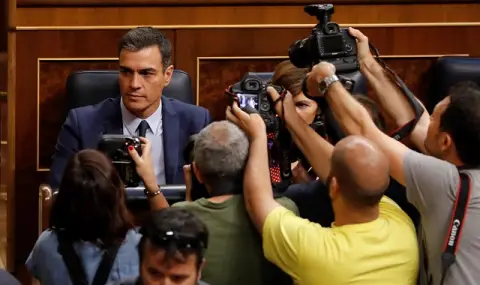Spanish Prime Minister Pedro Sánchez - a specialist in political survival since leading the Spanish left - is in a particularly vulnerable position after the opening of a judicial investigation against his wife - another dramatic episode in a rather stormy career.
"I learned to give the maximum until the referee blows the end of the match,", wrote the 52-year-old leader of the Spanish Socialist Workers Party (ISRP) - a former amateur basketball player - in an autobiography published in 2019, and entitled " ;Resistance Handbook".
Yesterday Sanchez announced that he was "considering" this "end of the game" after a court in Madrid said it was opening a preliminary investigation against his wife on charges of corruption and influence peddling.
In a letter to the Spaniards, Pedro Sánchez asks whether he should "continue to be at the head of the government or /.../ renounce this honor". That is a question he will answer on Monday.
With his charming smile and photogenic personality, the socialite, called at the beginning of his career "El Guapo" ("The Handsome") because of his external resemblance to Cary Grant, from the very beginning of his career regularly gambled, which more than once helped him get out of difficult situations.
Pedro Sanchez was born on February 29, 1972 in Madrid. His mother is a civil servant and his father is a businessman.
Sánchez is an economist by education. He has been accused of plagiarism in his dissertation - something he has always denied.
At the first ISRP primary elections in 2014, he took over the leadership of the party.
Relatively new to politics and not particularly well-known, he initially defined himself as a "ordinary activist". However, this first attempt ended in failure: the party recorded its worst electoral results in history and its leaders pushed it to the margins.
„At a time when many predicted the end of his political career, Pedro Sánchez still managed to return to the head of the ISRP just six months later, after touring the whole of Spain in his "Peugeot 407", for to meet with activists who supported him.
This tenacity of his catapulted him to power in June 2018 after a new adventure: uniting around his no-confidence motion all left-wing, Basque and Catalan parties, he ousted conservative Prime Minister Mariano Rajoy, weakened by a corruption scandal, and took over from him.
Leading a shaky majority, Sánchez was forced to call two consecutive parliamentary elections in 2019, which he won. Then, in early 2020, he agreed to a "marriage of convenience" with his former "brothers and rivals" from "Podemos" (left-wing radical party) to stay in power for a long time.
Under a minority government, despite ongoing tensions with his coalition partners, Sánchez managed to reform the labor market and pensions, increase the minimum wage by 50 percent and introduce a law to rehabilitate the memory of the victims of the Civil War (1936-1939) and the Franco dictatorship (1939-1975).
Doomed to political death after the left's failure in local elections last May, Sánchez again made a risky move by calling early parliamentary elections in July, in which his party came second to the People's Party of his conservative rival Alberto Nunes Feijoo.
p>
A former member of the UN High Representative's office in Bosnia, Sanchez, described as a skilled and pragmatic man, eventually returned to power in November with the help of parliament, but at the cost of further major concessions.
p>
Chief among them was a controversial amnesty law for Catalan separatists involved in the 2017 secession attempt - something Sánchez has opposed in the past.
Translation from French - Alexey Margoevski, BTA
